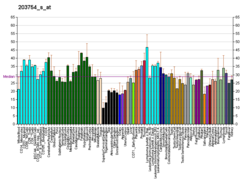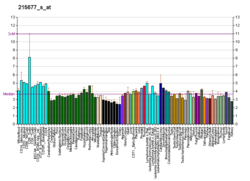Transcription factor IIIB 90 kDa subunit is a protein that in humans is encoded by the BRF1 gene.
Function
This gene encodes one of the three subunits of the RNA polymerase III transcription factor complex. This complex plays a central role in transcription initiation by RNA polymerase III on genes encoding tRNA, 5S rRNA, and other small structural RNAs. The gene product belongs to the TF2B family. Three alternatively spliced variants encoding three different isoforms, that function at different promoters transcribed by RNA polymerase III, have been identified. A transcript encoding a fourth isoform has not yet been completely characterized.
Interactions
BRF1 (gene) has been shown to interact with:
References
- ^ GRCh38: Ensembl release 89: ENSG00000185024 – Ensembl, May 2017
- ^ GRCm38: Ensembl release 89: ENSMUSG00000011158 – Ensembl, May 2017
- "Human PubMed Reference:". National Center for Biotechnology Information, U.S. National Library of Medicine.
- "Mouse PubMed Reference:". National Center for Biotechnology Information, U.S. National Library of Medicine.
- ^ Wang Z, Roeder RG (August 1995). "Structure and function of a human transcription factor TFIIIB subunit that is evolutionarily conserved and contains both TFIIB- and high-mobility-group protein 2-related domains". Proc Natl Acad Sci U S A. 92 (15): 7026–30. Bibcode:1995PNAS...92.7026W. doi:10.1073/pnas.92.15.7026. PMC 41464. PMID 7624363.
- Mital R, Kobayashi R, Hernandez N (January 1997). "RNA polymerase III transcription from the human U6 and adenovirus type 2 VAI promoters has different requirements for human BRF, a subunit of human TFIIIB". Mol Cell Biol. 16 (12): 7031–42. doi:10.1128/MCB.16.12.7031. PMC 231706. PMID 8943358.
- ^ "Entrez Gene: BRF1 BRF1 homolog, subunit of RNA polymerase III transcription initiation factor IIIB (S. cerevisiae)".
- ^ Sutcliffe JE, Cairns CA, McLees A, Allison SJ, Tosh K, White RJ (June 1999). "RNA polymerase III transcription factor IIIB is a target for repression by pocket proteins p107 and p130". Mol. Cell. Biol. 19 (6): 4255–61. doi:10.1128/mcb.19.6.4255. PMC 104385. PMID 10330166.
- Johnston IM, Allison SJ, Morton JP, Schramm L, Scott PH, White RJ (June 2002). "CK2 forms a stable complex with TFIIIB and activates RNA polymerase III transcription in human cells". Mol. Cell. Biol. 22 (11): 3757–68. doi:10.1128/mcb.22.11.3757-3768.2002. PMC 133823. PMID 11997511.
- McCulloch V, Hardin P, Peng W, Ruppert JM, Lobo-Ruppert SM (August 2000). "Alternatively spliced hBRF variants function at different RNA polymerase III promoters". EMBO J. 19 (15): 4134–43. doi:10.1093/emboj/19.15.4134. PMC 306597. PMID 10921893.
Further reading
- Chesnokov I, Chu WM, Botchan MR, Schmid CW (1997). "p53 inhibits RNA polymerase III-directed transcription in a promoter-dependent manner". Mol. Cell. Biol. 16 (12): 7084–8. doi:10.1128/MCB.16.12.7084. PMC 231711. PMID 8943363.
- Chu WM, Wang Z, Roeder RG, Schmid CW (1997). "RNA polymerase III transcription repressed by Rb through its interactions with TFIIIB and TFIIIC2". J. Biol. Chem. 272 (23): 14755–61. doi:10.1074/jbc.272.23.14755. PMID 9169441.
- Wang Z, Roeder RG (1997). "Three human RNA polymerase III-specific subunits form a subcomplex with a selective function in specific transcription initiation". Genes Dev. 11 (10): 1315–26. doi:10.1101/gad.11.10.1315. PMID 9171375.
- Sutcliffe JE, Cairns CA, McLees A, Allison SJ, Tosh K, White RJ (June 1999). "RNA polymerase III transcription factor IIIB is a target for repression by pocket proteins p107 and p130". Mol. Cell. Biol. 19 (6): 4255–61. doi:10.1128/mcb.19.6.4255. PMC 104385. PMID 10330166.
- Hsieh YJ, Wang Z, Kovelman R, Roeder RG (1999). "Cloning and characterization of two evolutionarily conserved subunits (TFIIIC102 and TFIIIC63) of human TFIIIC and their involvement in functional interactions with TFIIIB and RNA polymerase III". Mol. Cell. Biol. 19 (7): 4944–52. doi:10.1128/MCB.19.7.4944. PMC 84305. PMID 10373544.
- Hsieh YJ, Kundu TK, Wang Z, Kovelman R, Roeder RG (November 1999). "The TFIIIC90 subunit of TFIIIC interacts with multiple components of the RNA polymerase III machinery and contains a histone-specific acetyltransferase activity". Mol. Cell. Biol. 19 (11): 7697–704. doi:10.1128/mcb.19.11.7697. PMC 84812. PMID 10523658.
- McCulloch V, Hardin P, Peng W, Ruppert JM, Lobo-Ruppert SM (August 2000). "Alternatively spliced hBRF variants function at different RNA polymerase III promoters". EMBO J. 19 (15): 4134–43. doi:10.1093/emboj/19.15.4134. PMC 306597. PMID 10921893.
- Johnston IM, Allison SJ, Morton JP, Schramm L, Scott PH, White RJ (June 2002). "CK2 forms a stable complex with TFIIIB and activates RNA polymerase III transcription in human cells". Mol. Cell. Biol. 22 (11): 3757–68. doi:10.1128/MCB.22.11.3757-3768.2002. PMC 133823. PMID 11997511.
- Cabart P, Murphy S (2002). "Assembly of human small nuclear RNA gene-specific transcription factor IIIB complex de novo on and off promoter". J. Biol. Chem. 277 (30): 26831–8. doi:10.1074/jbc.M203119200. PMID 12016223.
- Willis IM (2002). "A universal nomenclature for subunits of the RNA polymerase III transcription initiation factor TFIIIB". Genes Dev. 16 (11): 1337–8. doi:10.1101/gad.998102. PMID 12066800.
- Stoecklin G, Colombi M, Raineri I, Leuenberger S, Mallaun M, Schmidlin M, Gross B, Lu M, Kitamura T, Moroni C (September 2002). "Functional cloning of BRF1, a regulator of ARE-dependent mRNA turnover". EMBO J. 21 (17): 4709–18. doi:10.1093/emboj/cdf444. PMC 126184. PMID 12198173.
- Weser S, Riemann J, Seifart KH, Meissner W (2003). "Assembly and isolation of intermediate steps of transcription complexes formed on the human 5S rRNA gene". Nucleic Acids Res. 31 (9): 2408–16. doi:10.1093/nar/gkg345. PMC 154231. PMID 12711686.
- Schmidlin M, Lu M, Leuenberger SA, Stoecklin G, Mallaun M, Gross B, Gherzi R, Hess D, Hemmings BA, Moroni C (December 2004). "The ARE-dependent mRNA-destabilizing activity of BRF1 is regulated by protein kinase B". EMBO J. 23 (24): 4760–9. doi:10.1038/sj.emboj.7600477. PMC 535089. PMID 15538381.
External links
- FactorBook BRF1
- Human BRF1 genome location and BRF1 gene details page in the UCSC Genome Browser.
This article on a gene on human chromosome 14 is a stub. You can help Misplaced Pages by expanding it. |






